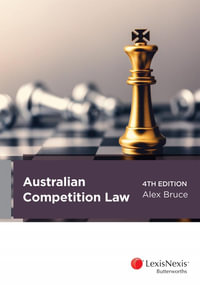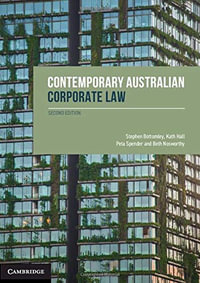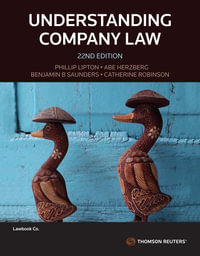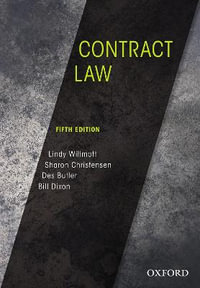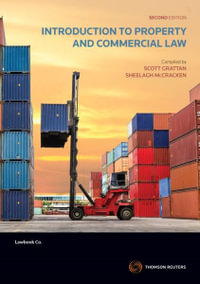This book contains the most detailed multi-jurisdictional analysis of directors' conflicts available drawing together relevant case law, codes and statutory regulation from the law applying to directors of companies incorporated under the UK Companies Acts, with extensive reference to the law in Australia, Canada, Hong Kong and New Zealand.
The book provides comprehensive analysis of the conflicts faced by directors and includes the important areas of conflicts of interest, conflicts of duties, unauthorised profits, corporate opportunities, multiple directorships, nominee directorships, and conflicts involving stakeholders' interests. Difficult aspects of these topics are analysed with reference to the laws of a range of common law jurisdictions. The extensive multi-jurisdictional analysis allows solutions to be presented in relation to difficult legal issues and enables clarification of the legal approach.
In addition to detailed coverage and analysis of general law duties, the specific statutory duties are outlined and analysed including those concerning related party transactions. The UK Corporate Governance Code, and Guidance on Board Effectiveness, issued by the FRC in July 2018 are covered extensively. The book provides detail on fiduciary theory, the reach of the term 'director', consequences of a breach, remedies, authorisation and the role of disclosure. It also contains a detailed table of key cases concerning corporate opportunities which includes the pertinent facts, whether there was a breach of directors' duties, and a summary of the important factors in the decision made. The cases are featured in order from instances representing clear breach to those in which no breach was found.
T
he book is significant in its thorough coverage of general law and statutory duties relating to conflicts, and its clarification of the scope and application of currently complex and uncertain duties. It provides clear guidance to academics, practitioners, directors and regulators in each of the jurisdictions on the regulation of conflicts of interest and the implementation of good regulatory practice. This is a key reference work on this important and dynamic area of company law which provides careful analysis of the law set in a practical context.
Industry Reviews
This is an ambitious and impressive work: ambitious because of the breadth of material traversed and impressive because of the clarity with which the author analyses and explains the diverse elements of this area of law ... Apart from being an important reference work in this topical and complex area of law, the strengths of the book lie in the range of perspectives from which each topic is examined and the tenacious examination of contested issues, such as the circumstances giving rise to a positive obligation of disclosure, and the potential to mould fiduciary duties by reference to the scope of the fiduciary relationship. This work will be an invaluable addition to the library of corporate law academics and practitioners alike. * Elizabeth Boros, Journal of Equity *
Professor Langford has seamlessly woven together challenging conceptual debates and theoretical analysis with concrete practical guidance as well as ideas about reform. This book will prove invaluable to directors, advisors, policy-makers, students, and judges alike. And its timing is perfect. Both here and abroad, there has been a renewed focus on directors' conflicts and duties [] every company director and every adviser, as well as those dealing with company directors' duties and conflicts of interest in any capacity, should read the book, understand the book and follow the book - it is practical, powerful, poignant and persuasive. * Justice Gordon AC, High Court of Australia *
Directors' conflicts are a significant and long standing issue that has not been satisfactorily resolved [] the really exciting aspect of Professor Langford's writing is that the discussion of these theoretical ideas is firmly grounded in their practical implications and the practical possibilities that they generate. It is, I think, ground-breaking research. * Justice Gordon AC, High Court of Australia *
Rarely does one encounter a work that judges, scholars, teachers, practitioners and advance level students will find invaluable from a doctrinal, theoretical and policy perspective. Professor Rosemary Langford's book is an exemplar. Her analysis of directorial conflicts of interest, which is one of the most difficult and contested areas in company law, is incisive and persuasive. Her exposition of the case law in multiple jurisdictions is clear and comprehensive. No doubt this outstanding piece of scholarship will be widely read and cited. * Dr Ernest Lim, Faculty of Law, National University of Singapore *
Conflicts of interests in relation to the duties of directors is a difficult and demanding area of the law and yet in this book Rosemary Teele Langford has provided us not only with a comprehensive, scholarly and very well-written exposition of the law, she has made the law as clear as one can do so. In the course of doing this, the author demonstrates a very good understanding of the position across several jurisdictions of the Commonwealth (and Hong Kong). Importantly, the footnoting is excellent and particularly helpful for further study. Writing a book that is of benefit to both academia and practice is never easy, but I believe that the author has been able to achieve this as the book is of immense value to both the corporate law academic and the legal practitioner. * Professor Andrew Keay, School of Law, University of Leeds *
One of the beauties of this book is its ease of use. It presents itself in a clear, straightforward, logical manner. Each of its twelve chapters starts with an introduction and ends with a useful summary in the conclusion. Paragraphs are numbered throughout and there is a detailed table of contents and index to facilitate the often-lengthy process of looking things up. ... For practitioners, academics and judges, as well as students involved with this area of the law, this book is a useful and indeed essential acquisition. * Phillip Taylor MBE, Head of Chambers, and Elizabeth Taylor, Richmond Green Chamber *
The topic of Conflict of Interest is one of central importance to company law and corporate governance and the author has done an excellent job in discussing British Commonwealth caselaw. ... The book is to be welcomed as a valuable addition to the literature. * John Farrar, Company and Securities Law Journal *
Dr Rosemary Langford is right to say in her preface that the subject of directors' conflicts has eluded clear guidance, and a work devoted to the subject is overdue. This book is therefore particularly welcome ... A monograph enables the author to analyse a subject with a depth and a breadth not possible in a more general work. Dr Langford has taken full advantage of this opportunity. * Rt Hon Lord Justice David Richards *
Dr Langford tackles all these areas not only in depth but also in breadth. She draws together the law in the UK, Australia, Hong Kong, Canada, and New Zealand. She is right to do so. I can say from my own experience that the judgments of the courts in these countries have a profound effect on the way in which similar cases are argued and decided in the other countries ... Given the universal nature of the problems and our common legal heritage, this is exactly as it should be. For all these reasons, as well as the scholarship demonstrated in each chapter, I warmly welcome this book as an important addition to the learning available to judges, practitioners, and academics concerned with this area of the law. * Rt Hon Lord Justice David Richards *


